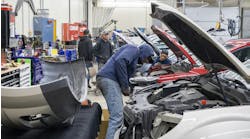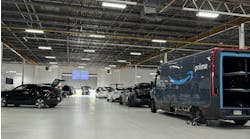Italian Body Shop Inc. (IBS) operated in an industrial area in Westerville, Ohio, for nearly 20 years. Tucked into a low-traveled pocket of town, the shop was surrounded by dingy-looking warehouses. And with almost no walk-in traffic, the shop had a tough time growing its customer base.
IBS, also known as IBS Collision Center, wasn’t able to rely on insurer referrals for more business, either. IBS president Rocco Lumbaca says the run-down warehouses surrounding his facility weren’t presentable enough to meet insurer standards, and insurers weren’t comfortable sending clients to his area.
That all changed in November 2000. Lumbaca picked up a piece of property in a commercially zoned area, right in the middle of the community served by IBS. Now, the shop sits within two miles of two highly traveled freeways, amidst other retail businesses like Home Depot, and surrounded by schools and residential areas.
In this well-maintained part of town, the shop has easy traffic access, and the shop’s customer base has increased enormously. Fender benders in the surrounding school and business parking lots drive a lot of work to the door, he says. Lumbaca now sees at least five walk-in customers a day.
building in industrial zones. The lessened approval
process is a huge benefit.”
—Dan Lajoie, vice president of real estate and
store administration, Sterling Autobody Centers
Insurers love the new location, too, especially the easy customer access, Lumbaca says. He landed five new DRP agreements right off the bat after making the move.
As good as that sounds, going commercial does have its costs: Compared to industrial zoning, taxes are likely to be higher and zoning regulations more strict. The best place for you depends on who your customers are and your strategy of acquiring business. For a location to benefit your shop, it’s got to fit your business strategy.
Get Noticed
The main benefit of a commercial zone is the visibility it offers. Even if your services aren’t needed today, you’re more likely to see more business if more customers can see you.
Industrial areas tend to be hidden in areas of town that aren’t highly traveled or highly desirable, says Scott Krause, managing member of Automotive Business Brokers. The public can’t easily see you, or find you, in those areas if they’re not directly referred. In those instances, your growth strategy hinges on customer referrals and word-of-mouth marketing.
Commercial areas, on the other hand, are filled with shopping centers and restaurants—and commuting traffic, says Dan Lajoie, vice president of real estate and store administration for Sterling Autobody Centers. “The public sees your signage and nicely finished vehicles in your parking lot all the time,” he says.
Customers will see—on a regular basis—that you’re a respectable business. That, Lajoie says, could be the tipping point that gets community members to come to you when they do need collision work.
Tax Ramifications
The price you’re likely to pay for a prominent location and solid road frontage? Increased property tax.
“Tax rates are directly tied to property value,” Krause says. “Commercial zones have higher tax rates than industrial zones about 75 percent of the time.”
Gary Boesel, owner of Jordan Road CARSTAR in Centennial, Colo., has his business in a commercial zone. Taxes are 30 to 40 percent higher, he says, than if he had built in a nearby industrial area. That’s no small difference in your operating costs.
It’s imperative to weigh your increased tax cost against your sales volume to understand whether the higher cost of a commercial location is worth it, Lumbaca says.
Contact your local government to obtain tax rate information for various properties in your area.
Zoning Regulations
Of course, you might not have the option to set up shop in a commercial zone. Some cities won’t allow collision repair centers in the zone.
You might, however, be able to get city council to approve your business as an exception to the regulation. That can be a lengthy and time-consuming process. And if you win that battle, you’re still likely to face strict facility requirements.
Commercial zones more stringent rules and requirements often include specifications for the look of your storefront, landscaping and parking configurations, to name a few. And local government tends to monitor compliance quite closely, Lajoie says.
When Sterling looks to open a new location, Lajoie attends the city council planning meetings. He answers questions about how a proposed facility will match surrounding businesses, the type of work that will take place, and the types of pollutants the business emits. The elaborate process of securing government approval requires significant time and patience to educate city councils on the modern collision repair industry.
In 2010, for instance, Sterling wanted to open a new location. The property site was surrounded by community members concerned about having a body shop in the area, Lajoie says. He made his case at three planning meetings with the city council and the local neighborhood association. Still, no one was convinced. So the city council suggested an onsite review in another one of Sterling’s nearby shops.
Lajoie gave city council members a physical tour of the facility and walked them through the shop’s repair process. The eco-savvy processes in the shop helped city officials feel more comfortable with having body shops in the area. Sensing this, Lajoie made a point to describe the shop’s methods of testing air quality and waste streams in order to improve his chances of obtaining approval.
Such an extensive, intense process can be a major downfall of commercially zoned areas. You might go through a lot of hassle to get approved, and there’s a chance you’ll never get approved. Shop operators can avoid most of that trouble with industrial zones.
“Industrial zones tend to be properly zoned for auto body shops from the start,” Lajoie says. “You’ll have fewer meetings to attend and lower costs for building in industrial zones. The lessened approval process is a huge benefit.”
Check out FenderBender’s July 2011 article “City Councils and Zoning Requirements” for more information on how to acquire zoning regulations for your area.
Deciding The Bout: Commercial vs. Industrial
Sure, everybody wants to be located in an area where community members will notice the business. But with the possibility of higher taxes and headaches in complying with zoning regulations, you need to do more than soul-searching to know whether it’s really worth it. Consider these factors as you make the decision:
• Know your customer. Identify where the majority of your work comes from. Independent shops with few insurer DRP agreements will want to have the best possible road frontage, Krause says. Those shops thrive off walk-in traffic, which can be difficult to obtain in industrial areas that can’t be easily found.
On the flipside, shops that acquire a majority of work through insurer referrals might not be interested in more walk-in business. In those instances, there isn’t much benefit to locating in a commercial zone, Lumbaca says. If you’re fine with the amount of business you have—and your insurer relationships continue—it might be worthwhile to avoid the tax hikes associated with commercial zones.
• Know your marketing strategy. Lajoie says some shops, like Sterling, base part of their marketing strategy on the look, aesthetics and surroundings of their facility. You might experience a lost marketing opportunity by being in an industrial zone if your marketing strategy is based on curb appeal.
• Calculate your sales-rent ratio. Generally, auto repair businesses should spend no more than 10 to 12 percent of annual revenue on rent costs, Krause says. Identify your total rent costs, including taxes and insurance, as a percentage of total sales.
Remember, rent is a fixed cost: You have to pay that expense regardless of what sales are like. So if you’re considering moving to a commercial zone with higher taxes, you need to be able to project a sales increase that justifies the additional expense, Krause says. If your sales projection doesn’t outweigh the tax increase, you’re taking a big financial risk to move.
• Identify the physical needs for your facility. Finding the right sized real estate in commercial zones can be challenging for shop owners, Lajoie says. Depending on the throughput of your shop, it could be hard to locate property large enough for your facility and parking needs.
• Keep it clean. It could detract from your image if your shop is in an area that isn’t well maintained or kept clean, Lajoie says.
If you’re considering an industrial park, make sure your neighboring businesses also look good so they don’t detract from the clean, respectable image you’re trying to portray—which is what happened to Lumbaca when warehouses surrounded his repair center.
The Best Zone for Your Business
There is no magic answer that dictates the best zone for your business, Krause says. It depends on your business
circumstances.
Shop owners need to do their homework, assessing the pros and cons of each zone. That is the only way to get a clear sense of whether a commercial zone or an industrial one will best suit your business needs.



